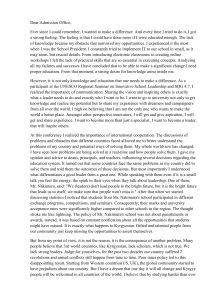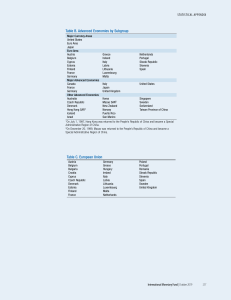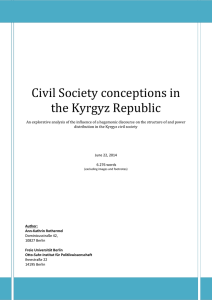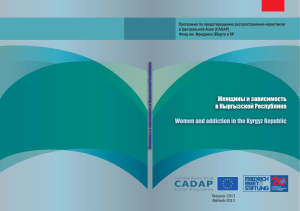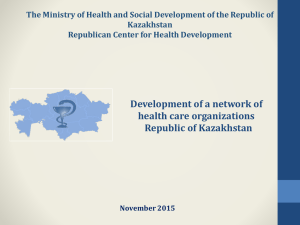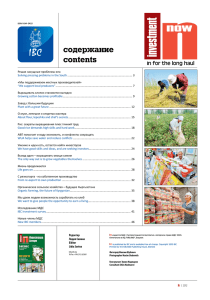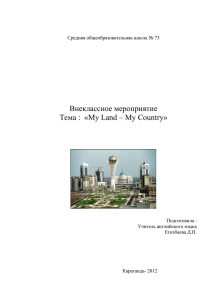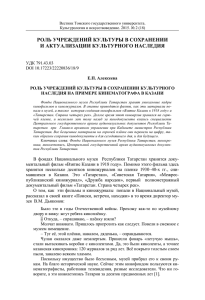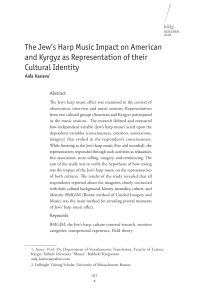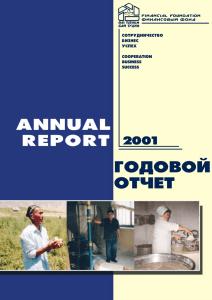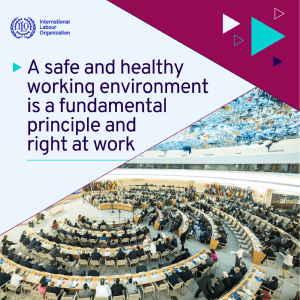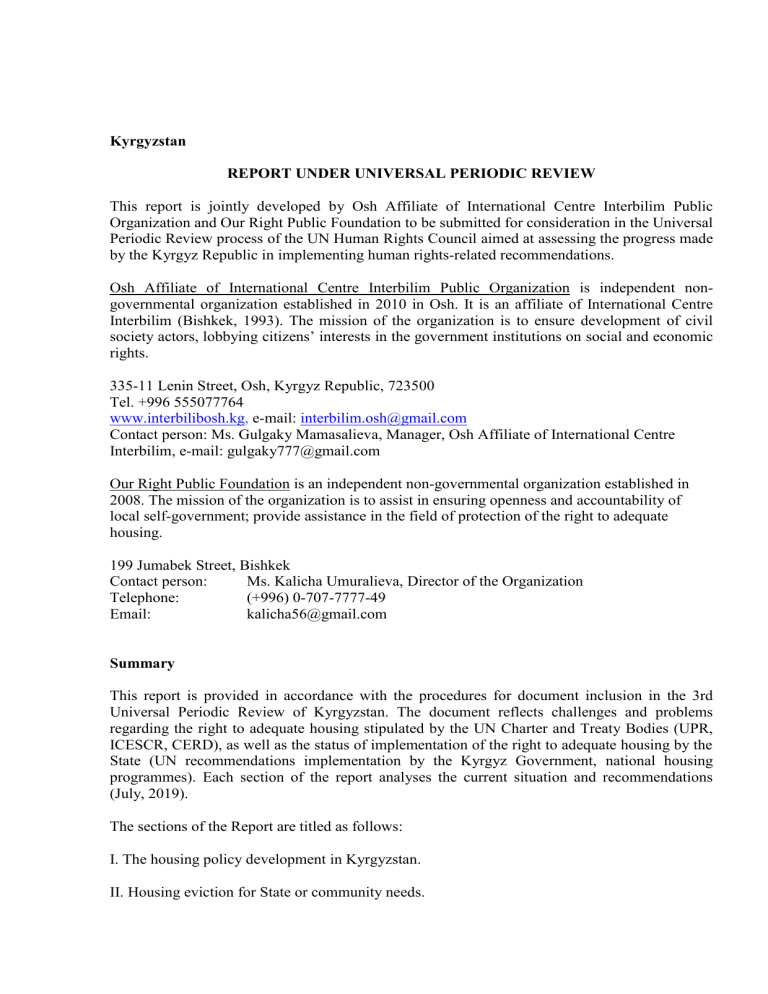
Kyrgyzstan REPORT UNDER UNIVERSAL PERIODIC REVIEW This report is jointly developed by Osh Affiliate of International Centre Interbilim Public Organization and Our Right Public Foundation to be submitted for consideration in the Universal Periodic Review process of the UN Human Rights Council aimed at assessing the progress made by the Kyrgyz Republic in implementing human rights-related recommendations. Osh Affiliate of International Centre Interbilim Public Organization is independent nongovernmental organization established in 2010 in Osh. It is an affiliate of International Centre Interbilim (Bishkek, 1993). The mission of the organization is to ensure development of civil society actors, lobbying citizens’ interests in the government institutions on social and economic rights. 335-11 Lenin Street, Osh, Kyrgyz Republic, 723500 Tel. +996 555077764 www.interbilibosh.kg, e-mail: interbilim.osh@gmail.com Contact person: Ms. Gulgaky Mamasalieva, Manager, Osh Affiliate of International Centre Interbilim, e-mail: gulgaky777@gmail.com Our Right Public Foundation is an independent non-governmental organization established in 2008. The mission of the organization is to assist in ensuring openness and accountability of local self-government; provide assistance in the field of protection of the right to adequate housing. 199 Jumabek Street, Bishkek Contact person: Ms. Kalicha Umuralieva, Director of the Organization Telephone: (+996) 0-707-7777-49 Email: kalicha56@gmail.com Summary This report is provided in accordance with the procedures for document inclusion in the 3rd Universal Periodic Review of Kyrgyzstan. The document reflects challenges and problems regarding the right to adequate housing stipulated by the UN Charter and Treaty Bodies (UPR, ICESCR, CERD), as well as the status of implementation of the right to adequate housing by the State (UN recommendations implementation by the Kyrgyz Government, national housing programmes). Each section of the report analyses the current situation and recommendations (July, 2019). The sections of the Report are titled as follows: I. The housing policy development in Kyrgyzstan. II. Housing eviction for State or community needs. III. Realization of disadvantaged citizens’ rights to housing. *** The 2010 Constitution of the Kyrgyz Republic enshrines fundamental rights and freedoms to housing. Thus, Article 12 of the Constitution of the Kyrgyz Republic states that “property is inviolable. No one shall be arbitrarily deprived of their property.” The Constitution recognizes and protects the right to housing. The Constitution imposes obligations on public authorities – both at the central and local levels - to create the conditions for the realization of the right to housing, including provision of housing free of charge or at an affordable cost to economically disadvantaged people and other persons in need. The Constitution also recognizes the right to inviolability of the home and provides that the search, seizure, inspection or other action, or entry of agents of the public authorities into a home or other buildings owned or otherwise possessed is allowed only on the basis of a judicial instrument. However, the legislation of the Kyrgyz Republic does not guarantee full protection of citizens’ rights and freedoms in the sphere of adequate housing; the lack of relevant mechanisms for implementation of this right creates settings for violation of the citizens’ right to housing by the authorities. In some cases, it is possible to say that the authorities ignore international and national norms in the field of citizens’ right to adequate housing. The UN human rights mechanisms issued six recommendations regarding the right to adequate housing aiming at improving Kyrgyzstan’s compliance with international human rights standards.1 However, not all of them have been implemented by the Kyrgyz Republic. I. The housing policy development in Kyrgyzstan. In 2015, the Committee on Economic, Social and Cultural Rights reviewed the combined second and third periodic reports of Kyrgyzstan on implementation of International Covenant on Economic, Social and Cultural Rights, and issued Concluding observations on the combined second and third periodic reports of Kyrgyzstan2. In paragraph 19 titled Homelessness and the Right to Adequate Housing of its Concluding Observations, the Committee recommends that the State party implement a national strategy for the reduction of homelessness that includes measurable goals and timetables. Paragraphs 5.124 also states that the State shall ‘take measures to develop a national strategy ensuring full realization of the right to adequate housing.’ Unfortunately, we are compelled to note that the State failed to implement this recommendation. The country lacks an adequate housing policy, to include social housing and reduction of homelessness. In 2000, the housing policy was approved by the Decree of the President of the Kyrgyz Republic No. 76 dated April 6, 2000 on the Concept for Housing Construction Development until 2010. In 2007, the Government Decree No. 562 of 26 November 2007 approved the National Housing Construction Programme for 2008-2010. However, not a single point of this policy was implemented. In 2015, the Affordable Housing Program of the Government of the Kyrgyz Republic for 20152020 was adopted and approved by the Kyrgyz Government Resolution No. 560 dated August 5, 2015. However, the Special Report of the Ombudsman regarding implementation of Bishkek citizens’ right to adequate housing states that “...the current 2015-2020 Affordable Housing 1 2 Annex to this report on the status of the UN recommendations implementation th Approved by the Committee at its 55 session (June 1−19, 2015). programme does not meet the needs of the most vulnerable groups of the population, who due to low income, employment in informal sector, lack of documents, homelessness are not able to benefit from this program. The program does not provide for the development of housing that is not meant for home ownership; however, some forms of housing such as long-term rental, paid dormitories based on various forms of ownership can be considered as an approach to ensure housing for the most vulnerable citizens.3” Moreover, the program is focused on mortgage loans, which in the Kyrgyz context resulted in ‘mortgage’ homeless people due to lack of long money and cheap monetary means in banks. In the state’s understanding ‘mortgage lending’ means establishment of the state mortgage company which receives interest-free money from the budget; however, the people get credits at 14% of annual rate. The Law of the Kyrgyz Republic on State Mortgage Lending adopted on May 4, 2017 does not address the problem, but, on the contrary, aggravates the conditions of citizens. The lack of proper housing policies has resulted in the following societal problems and conflicts. 1. The UN Special Rapporteur on the Right to Adequate Housing, having examined the issue of private property acquisition, suggested that the States should focus on the development of rental housing and rental relations rather than on home ownership. In this regard, the Housing Code of the Kyrgyz Republic stipulates a norm that allows provision of the service housing in order to engage citizens in unprofitable socially-oriented spheres of economy. At that, citizens who have lived in this housing and worked in this place for 20 years have the right to purchase and own this housing at remaining book value which is is quite low after 20 years. But in practice, this norm does not work, or is not implemented by the executive authorities. 2. Another type of home ownership is acquisition of housing through equity construction. The lack of proper legal framework regulating this type of commercial housing has also resulted in major conflicts and discontent of the population, as well as created corruption in the field of construction. The boundless thirst for profit among developers’ companies, overstatement of the housing costs, deprived many shareholders of housing or money. Thus, they joined the category of homeless citizens. 3. In Kyrgyzstan, multistory houses account for 30% of the housing stock. Privatization of apartments in such buildings created the problem related to shared property, and the house plots. Despite the proper current legislation, only single owners were able to receive house plots’ documents in compliance with the norms of the Land and Housing Codes. Many house owners have lost their property due to corruption in the construction sector; collusion between officials and construction companies has resulted in illegal seizure of these land plots to be used for construction purposes. These actions violated the right of citizens to shared property and limited their access to the green and children’s play areas. The General Prosecutor of the Kyrgyz Republic, together with Our Right Public Foundation, repeatedly repealed legal acts that restricted this right to shared property. Over the past five years, local NGOs were involved in 120 cases restoring the right to shared ownership, which accounts for 5% of the total housing stock in apartment buildings. Recommendations: Considering the above-mentioned, the State shall develop adequate housing policy in accordance with international standards and the State’s capabilities to ensure the following: - Regulate rental housing; - Regulate shared construction; - Regulate common/shared property in apartment buildings; 3 http://www.ombudsman.kg/files/docs/reports/2016/new-buildings.pdf. 1.1. Rental housing. 1.1.1 It is necessary to develop the norms stipulated in the Civil Code of the Kyrgyz Republic and adopt a separate law and by-laws regulating this issue, defining the rights and obligations of tenants and landlords. 1.1.2 The state and municipal rental housing shall be built and provided to public and municipal employees, as well as to vulnerable groups of population. 1.1. Equity construction. 1.1.1 It is necessary to adopt the Law of the KR on Equity Construction, which stipulates the norms for any construction company to have 70% of the construction cost in its account in order to avoid frauds. 1.1.2 It is also necessary to develop the initiative proposed by Our Right PF to Bishkek Mayor’s Office regarding the need for approval of detailed design projects in areas of renovation on a quarterly basis. This will allow to stop urban in-fills, and violation of landowners’ rights. 1.1.3 Develop a number of regulatory and legal acts regarding renovations. 1.1.4 Develop housing construction through housing construction cooperatives (HCCs). 1.2. Shared property in apartment buildings. 1.2.1. General Prosecutor Office of the Kyrgyz Republic to adopt acts for procuratorial actions in case of shared property transfers to owners of residential and non-residential premises in apartment buildings; 1.2.2 The Government of the Kyrgyz Republic and the General Prosecutor Office of the Kyrgyz Republic shall take measures to encourage LSG bodies to implement Resolutions of Jogorku Kenesh of the Kyrgyz Republic and the Government of the Kyrgyz Republic regarding shared property; 1.2.3 LSG bodies shall carry out an inventory of municipal property, and transfer the property that is a shared property by law to owners of residential and non-residential premises in apartment buildings; 1.2.4. Registration bodies together with architecture bodies shall identify disputed shared property. II. Housing Eviction for State or Community Needs; The UN human rights mechanisms have urged Kyrgyzstan to ensure full compliance of the national legislation with international obligations regarding evictions and resettlement only in case when these measures are justified.4 A similar recommendation was made by the UN Treaty Body, the CERD, in 2018: to take the necessary measures to ensure effective legal safeguards against arbitrary land expropriation and forced evictions, and ensure that the population is aware of and able to benefit from such safeguards; as well as include provisions on compensation and alternative housing in national legislation, and ensure that house demolitions and forced evictions are used only as a last resort;5 2.1. Thus, the Kyrgyz State received recommendations on eviction and expropriation of land procedures twice (2015, 2018). Unfortunately, the authorities of the Kyrgyz Republic have not taken any actions yet to improve the norms and practices to realize the right to housing in case of eviction. According to the current Land Code of the Kyrgyz Republic, the development of procedures and mechanisms for housing eviction is delegated to the Government of the Kyrgyz Republic. However, so far, these mechanisms are not included in the legislation. The lack of special norms allows the executive authorities to implement procedures for land eviction in 4 5 ICESCR 19 (a). CERD, 26d different cases at their own discretion, without taking into account the interests of the disabled persons, single mothers and children. In 2015, the Ministry of Justice of the Kyrgyz Republic made an effort to draft the Government Regulation on Land Revocation Procedures for State Needs. Since this draft did not comply with the provisions of the Constitution of the Kyrgyz Republic and international standards, and did not guarantee freedom and the right to housing, the draft was withdrawn by the civil society. According to Article 20 of the Constitution of the Kyrgyz Republic it is prohibited to adopt bylaws restricting human and civil rights and freedoms. The need to develop a special law may also be justified through Part 6, Article 12 of the Constitution of the Kyrgyz Republic, which provides that procedures for the owners to exercise their rights, and safeguards for their protection are determined by the law. Therefore, it is recommended that revocation issues shall be regulated by a higher-level normative legal act - the law, rather than by the Government Regulation. In December 2018, representatives of civil society submitted the norms regulating housing eviction to the Ministry of Justice, and requested to integrate them into the draft Land Code, that was placed on the website of the Ministry of Justice for public discussion. Unfortunately, not a single proposal from the civil society regarding regulation of house demolition and eviction for state and community needs was included in the new draft Land Code of the Kyrgyz Republic. The new draft Land Code proposes to make evictions as a last resort through the court, when the court can issue decisions in terms of reasonableness and legality of eviction justification. In practice, in case of forced evictions, disputes often arise due to unfair compensations and resettlement in disadvantaged locations. 2.2 Compensations. Since 2010, there has been an increase in the number of forced household evictions, especially regarding the property of ethnic minorities. In Osh, Kyrgyzstan, 22 households of ethnic minorities were demolished and evicted (repurchase) by local authorities in 2012-13, and 28 households were evicted by Jalal-Abad municipality in 2014. In 2017, 34 ethnic minorities’ households were evicted in the Kyrgyz - Uzbek border area. In all cases, the rights of citizens to property were violated. Forced evictions affected around 450 ethnic minorities’ representatives. Through intervention of Interbilim, only 34 out of 82 households received proportional compensations. However, there are no mechanisms for fair calculation of compensations in case of housing evictions established by the State. The Committee on the Elimination of All Forms of Racial Discrimination made the following recommendations in 2018: to include a provision on compensation and alternative housing in the national legislation (24.d).6 Unfortunately, the State has not yet taken any steps to incorporate these recommendations into its land and housing legislation. Moreover, the Government of the Kyrgyz Republic made a commitment to implement paragraph 24 within its interagency plans (20192020) for implementation of the CERD recommendations; however, the action plans do not propose any specific activities, but rather describe it in general terms - ‘to take measures to address disparities among ethnic minorities in their enjoyment of economic and social rights.’ In doing so, the State escapes from its obligation to enhance the Kyrgyz legislation in terms of improving voluntary eviction mechanisms and proportionate compensations. The existing eviction norm in the legislation of the Kyrgyz Republic does not fully implement the Constitutional provision on prerequisite for exercise of the right. Meanwhile, the importance of interim compensation or provision of equivalent housing shall be considered through the 6 CERD, 24.d prism that, in addition to the risk of homelessness, persons who are deprived of their property may be completely deprived of their means of subsistence and income, and they will have to adapt to a new place of residence and new circumstances, and their standard of living may decrease. It may also affect children’s access to education, loss of social relations, breakup of kinship ties, etc. On the other hand, there is a risk that the country will not achieve SDG targets, and this will generate poverty, and cause a five-year setback in human development. Within 2 to 3 years after eviction, residents whose households were demolished or evicted have to live on less than USD$1.25 per day. 2.3 Guarantees for the protection of the rights. There are no conditions to challenge unfair compensations in courts, no conditions for alternative assessment and comparison of prices, no conditions for free choice of instruments for property valuation. Citizens have limited access to information on city planning documents, which are often the reason for housing eviction. The practice of eviction for State needs demonstrates that all demolition and eviction notifications are delivered in a short notice. Moreover, ethnic minorities have limited access to information related to the grounds for eviction, procedures for demolished property assessment and terms of contracts’ discussions. They have also limited opportunities to get information in their native language. In 2015, CESCR recommended to duly justify any evictions or resettlements. As of today, the country did not establish or enshrine in its legislation any mechanisms related to the provision of information to citizens regarding any housing eviction cases. Currently, the citizens are deprived of the following rights in case of eviction: Access to meaningful consultations; Proper and early notification; Information on planned resettlements/eviction within a reasonable time frame; Prohibition of evictions in bad weather or at night; provision of legal remedies; Provision of legal aid to persons who need it, for them to seek redress through the courts. Residents often apply to non-governmental organizations in Kyrgyzstan in case of housing demolition or eviction. Local NGOs that protect citizens’ rights to adequate housing are often harassed and abused by the authorities. It particularly refers to cases when they protect the interests of ethnic minorities. Thus, the leader of the Osh Interbilim affiliate was humiliated and abused by the Mayor of Jalal-Abad in 2017. In 2019, the head of Interbilim-Osh received insulting and humiliating words from Osh Mayor’s Office while protecting the rights of citizens. Currently, the NGO leader has initiated a lawsuit against Osh Mayor’s office employee to protect her honor, dignity and business reputation. It should be noted that an affront and insult towards local NGOs discourages victims to apply and seek consultations in civil society institutions. Recommendations: 2.1. Hold public hearings to discuss the draft Land Code of the Kyrgyz Republic, in particular involving vulnerable groups and ethnic minorities, whose houses are subject to demolition or eviction for state and community needs according to Master Plans for cities, villages and settlements. 2.2 Provide for special measures in the draft Land Code to ensure that evictions are carried out in strict compliance with the provisions of international human rights law, including a separate instruction on how to calculate losses in case of property demolition. Include proposals of the civil society regarding implementation of the right to housing in case of eviction in the draft Land Code. 2.2. Include activities to improve national legislation related to fair compensations, and alternative housing provision in case of evictions in the Government inter-ministerial plan for the CERD recommendations implementation. III. Realization of disadvantaged citizens’ rights to housing. 3.1. Introduction of private ownership for land, and privatization of agricultural lands resulted in creating another corrupt practice. Local government officials in collusion with the registration services carried out unlimited transfer of agricultural irrigated lands, which at the time of accession to independence amounted at only 7%, for housing construction. As a result, the country has lost 1,000 hectares of fertile irrigated lands, which may have a negative effect on food security and provision. In order to attract these people to their electorate, politicians repeatedly proposed to legalize these illegally seized lands. However, the state did not benefit from land seizure and the loss of agricultural land, but rather acquired a major problem - the socalled new settlements. To date, over 5,000 households in Bishkek and Osh suburbs have no property titles with a limited access to other services, health care services and education. The residents in these settlements are mostly poor people with internal migrant status. 3.2. One of the Committee’s recommendations under paragraph 26 (c) Pollution and Ground Contamination in the Concluding Observations is to ensure that residential areas are not located on or close to contaminated ground. In this regard, new buildings near landfills and animal burial sites are of particular concern.7 Despite the fact that the Housing Code of the Kyrgyz Republic prohibits construction of housing near these burial sites, people seize these lands and build housing there. The authorities do not take any measures to liquidate new settlements, thus posing a risk to epidemiological safety. This is noted in paragraph 2.3.2 of the Report of the Ombudsman of the Kyrgyz Republic on human and civil rights and freedoms observance in the Kyrgyz Republic in 2014.8 3.3. Signing of the Convention on Persons with Disabilities by the State requires the policy development related to persons with disabilities. Its lack has led to corruption in practice. For example, the State has allocated large sums of money to build houses for the blind and deaf community throughout the country. This led to corruption in non-commercial organization when their leadership allocated more than 50 per cent of the housing meant for the blind and deaf community to their close relatives and friends for monetary rewards. Criminal proceedings were initiated, and the judgment to punish the leader was issued. These actions of the blind and deaf leadership caused an outrage, including rallies, among members of the community. Judicial proceedings are currently under way, investigation to return this property, which was built through budget money, to the government ownership is initiated, followed by reallocation of housing through authorized social protection bodies. Similar violations of the right of people with disabilities to residual housing occurred in Osh in 2018, when apartments planned for 64 persons with disabilities were allocated to different people rather than to families who were on a 7 According to Nurlan Kerimkulov, head of Bishkek Sanitary and Environmental Service, about 20,000 people live near Bishkek landfill, and in the neighbourhood of cattle burial site and a cemetery; in 2006, they illegally seized these lands. Many of them are waste diggers. There is a risk of infectious diseases outbreak. 1,000 people live in the village near Osh landfill. 8 https://ombudsman.kg/images/files/reports/2014.pdf list for many years or persons with the first degree of disability. Investigations of violations related to apartment allocation procedures are currently underway. Officials who committed acts of corruption shall be prosecuted. However, punishment of officials does not help people with housing needs to restore their right to housing. Decisions are not reviewed, and PWDs are not allowed to participate in the work of the commission allocating housing. Not all persons could get an access to the housing stock built for the June events victims. Out of 100% of June events victims who were included in the program of socially assisted housing of the State Directorate for Reconstruction and Development (families of the killed and wounded), 20% of injured persons did not get apartments due to corrupt inter-governmental commission in charge of housing allocation. Recommendations: 3.1. Conduct an inventory of all illegal land seizures and ensure compliance with the law. Take adequate measures to return and restore agricultural lands. 3.2 Conduct an in-depth study of the situation of citizens living in prohibited and contaminated areas. Assess the damage to health, and human development in general. Take specific measures to resettle them in safer locations. 3.3 Accept the UN Committee recommendations regarding the reduction of the number of homeless people, and allocate relevant financial resources to implement this policy. Establish practices for public housing construction and its allocation through social protection system on a rental terms, develop clear criteria to identify persons and conditions for this type of housing provision. Address social housing issues, including housing planned for people with disabilities.
